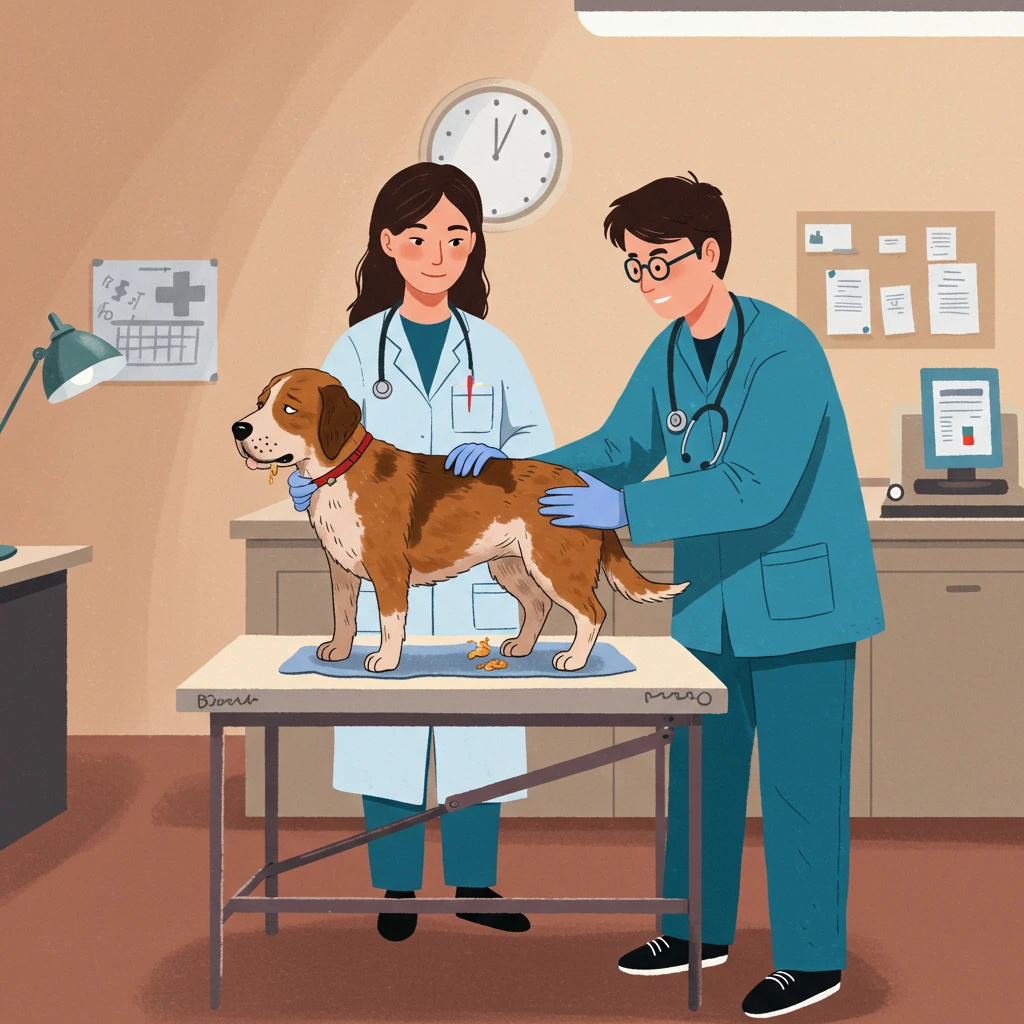Vomiting in dogs is a common symptom that can indicate a variety of health problems. When a dog vomits white foam, it can be particularly alarming for owners. This type of vomiting can result from relatively benign causes, but it can also signal more serious underlying health issues. This article aims to demystify this phenomenon by exploring possible causes, suggesting appropriate reactions, and providing practical advice for dog owners.
Possible Causes of White Foam Vomit
1. Gastrointestinal Illnesses
White foam vomiting is often associated with gastrointestinal disorders. Here are some common illnesses that can be the cause:
a. Gastritis
Gastritis, or inflammation of the stomach, can cause vomiting. It can be due to ingesting inappropriate foods, toxic products, or viral or bacterial infections.
b. Gastroenteritis
Gastroenteritis is a simultaneous inflammation of the stomach and intestines. It can result from an infection, food poisoning, or an allergic reaction to certain foods.
2. Ingestion of Foreign Objects
Dogs are naturally curious and may ingest non-edible objects. If a dog swallows a foreign object, it can cause intestinal obstructions and vomiting, sometimes of white foam, especially if the stomach is empty.
3. Metabolic Diseases
Certain metabolic diseases, such as kidney failure or diabetes, can also lead to vomiting. In these cases, white foam vomiting may be accompanied by other symptoms, such as excessive thirst or weight loss.
4. Stress and Anxiety
Stress and anxiety can cause vomiting in dogs. A change in environment, a move, or even a trip can be triggers. This can also manifest as white foam vomiting, especially if the dog hasn’t eaten.
5. Kennel Cough and Respiratory Infections
Certain respiratory infections, like kennel cough, can cause vomiting. This phenomenon is often accompanied by other symptoms, such as coughing, runny nose, and lethargy.
Urgent Reactions
1. Assess the Dog’s General Condition
If your dog is vomiting white foam, it’s essential to assess their general condition. Observe if they show other symptoms, such as:
- Diarrhea
- Lethargy
- Difficulty breathing
- Loss of appetite
2. Monitor the Frequency and Quantity of Vomiting
Keep a log of your dog’s vomiting. Note the frequency, quantity, and appearance of the vomit. This can be helpful for the veterinarian when evaluating the situation.
3. Don’t Delay Consulting a Veterinarian
If vomiting persists or if your dog shows other concerning symptoms, consult a veterinarian as soon as possible. Rapid intervention can be crucial, especially in cases of serious illnesses.
4. Don’t Administer Medication Without Veterinary Advice
Avoid giving your dog medication without veterinary advice. Some medications can worsen the situation or be dangerous for your pet.
Concrete Examples and Use Cases
Case 1: A Curious Young Dog
An owner noticed their puppy vomiting white foam after playing with plastic toys. After observing its behavior, they realized their puppy had ingested a piece of plastic. Upon consulting a veterinarian, it was recommended to monitor the puppy for other symptoms and to keep it away from toys that could break apart.
Case 2: An Older Dog with a History of Illnesses
An older dog began vomiting white foam. The owner noted weight loss and excessive thirst. After a veterinary examination, the dog was diagnosed with kidney failure. Appropriate treatment helped manage the illness, but it required regular vet visits.
Case 3: Travel-Related Stress
A dog that often travels with its family started vomiting white foam during a long car ride. The owners realized the dog was anxious. To manage the situation, they began using desensitization techniques and consulted a veterinarian for recommendations on anti-anxiety medication.
Key Points and Best Practices
- Observation: Carefully monitor your dog’s symptoms before deciding on the course of action.
- Consult a veterinarian: Don’t hesitate to consult a vet, especially if vomiting persists or is accompanied by other symptoms.
- Prevention: Avoid giving your dog non-edible objects and be vigilant during their playtime.
- Stress management: For dogs prone to anxiety, introduce relaxation techniques or consult an animal behavior professional.
Conclusion
White foam vomiting in dogs can be a sign of various conditions, ranging from benign gastrointestinal upsets to more serious illnesses. It’s crucial for owners to remain vigilant, assess their pet’s condition, and act quickly if needed. By following best practices and consulting a veterinarian, you can ensure your four-legged companion’s health and well-being. Remember that regular vet visits and careful attention to your dog’s diet and behavior can prevent many health problems.
Have you noticed any other symptoms accompanying your dog’s white foam vomiting, or are there specific circumstances that trigger this behavior?







